COVER- Two years, two bags: How she makes almost no trash

When your day job is measuring the health of waterways, it's a given you're going to be more aware of just how much humans can resemble parasites, sucking the very life out of the host we call planet earth.
That realization can result in eco-despair, depression, or even heavy drinking. Or you can do something about it.
For one Charlottesville woman, the flash of insight came at the end of 2008, when she took her garbage can out and looked up and down the street lined with filled trash cans, including her own.
"I couldn't pretend any more that my trash wasn't going to end up buried in someone's land or in the water," says Rose Brown. "There's not enough room on the planet for all the trash."
The now 32-year-old decided not to produce any trash the next year. Talk about a New Year's resolution.
On December 31, 2008, Rose Brown threw away her last bag of garbage and embarked on a journey that ultimately would be life changing. It's not one that she typically proselytizes about, but it's inspirational nonetheless. And as a result of her "zero garbage challenge," during the course of 2009, Brown produced just half a pound of rubbish that she couldn't otherwise recycle, reuse, or compost.
Let's say that again: approximately 8 ounces of garbage in one year in a country where the average citizen throws away 4.5 pounds of trash a day.
"So many things are going wrong in the environment that sometimes I think there's nothing I can do," says Brown. "I realized this was something I could do."
Zero garbage begins at home
The first thing you notice walking into Brown's Belmont abode is the lack of clutter. The small rooms don't feel stark, but simple, airy. What you'd notice on garbage day: no trash can on the street.
The notion to stop her own contribution into landfills began building in mid 2008.
"The idea got into my head," says Brown, a project manager for the nonprofit StreamWatch. "There's so much bad news in the state of the world and the environment. I was almost immobilized by guilt."
From garbage expert Annie Leonard, who wrote The Story of Stuff, Brown learned about planned obsolescence–- products are designed to fail within a certain period of time–- and that 99 percent of what we purchase will end up in a landfill within six months.
And then there's the Great Pacific Garbage Patch, a trash vortex in the Pacific twice the size of Texas.
"Because I work for watershed health, I was really struck by how much of our garbage is in the water," says Brown. And from local streams into rivers into the Chesapeake Bay, the oceans are getting clogged up with waste, much of it plastic, most of it coming from the land.
The word "challenge" is big for Brown and became a way to deal with her eco-guilt and channel it into positive action.
"I wanted to challenge the assumption that it's okay and correct to package my waste in plastic bags and send it off to someone else's land to be buried–- or to end up in a river or ocean," she writes on her blog.
And then there's the challenge of just saying no to garbage, no matter what the inconvenience.
"I realized I could make an impact on my own garbage, even if not everyone else's." But going to zero garbage is not like flicking a switch.
"I realized I'd have to do tons of preparation figuring out what products I could use," says Brown.
That's because garbage out begins with garbage in.
"I walked through the house and picked up anything I thought could break in the next year," says Brown. That meant getting rid of her automatic cat feeders, tons of toiletries, especially tubes and pump-top dispensers, her vacuum cleaner–- and rugs, so she could sweep instead of vacuum.
Four easy steps for food disposal
Because so much of our food is packaged, Brown had to change how she shopped and how she ate. She made a bunch of cloth bags and frequents places like Integral Yoga, Whole Foods, and Rebecca's that sell bulk foods. She uses her own bags to load up on beans or rice, and writes the product code in pencil on the thick drawstrings. She even brings her own container for bulk peanut butter.
"They weigh the container," says Brown. "They're very nice about it."
Unless a plastic item has a recycling symbol on it, Brown almost never buys it, and one that's tricky is the tamper-proof plastic under the lid of some containers.
"I remember missing cottage cheese because I couldn't find it without plastic," she says. "Now I find it with a foil top." (Foil is one of the most valuable recyclables.)
It helps that she's a vegetarian, so she doesn't have to bring home dripping slabs of beef or raw chicken in a cloth bag–- although she notes that butcher paper can be composted.
"My diet improved," says Brown.
With all that buying in bulk, and fewer prepared foods, she's cooking more.
And she's learned that a compost pile can degrade a multitude of sins: napkins, paper towels, "even a pizza box that's all gooey," she says, if you tear it into smaller bits. "There are tons of things that you can compost."
One of those biodegradable-but-noisy Sun Chips bags sits in her compost pile, and so far it hasn't broken down. (And most flavors of Sun Chips lost that packaging last month after complaints from noise-sensitive Americans.)
Brown assures us that she doesn't do any turning or rolling her "lazy" compost pile, and lists four easy steps on her blog for composting:
1. Assemble food scraps
2. Walk into your yard
3. Put food scraps in a pile
4. Wait
Zero garbage dining out
Even when she goes out to eat, Brown is determined that no scrap or disposable fork will go into the garbage stream because of her. So she carries the following in her purse: a travel mug, water bottle, a plastic bag, a container for leftovers, a cloth napkin, and silverware.
"This covers most situations," says Brown.
Even a disciplined re-user can encounter a learning curve in avoiding disposable dishes. "If I forgot my travel mug, I'd buy one," admits Brown, who says that such self-imposed punishments helped her get into the habit.
"If I'm eating out and I forget my container, I either eat all of the food on my plate, or I wrap the leftovers in a soggy little napkin and try to get them home before that napkin falls apart in my pocket," she writes on her blog.
If she's starting to sound saintly, it's only fair to point out that Brown admits she really misses junk food. When one thinks about greasy plastic bags, it's easy to see why those would be a casualty of the zero garbage life.
Travel, too, can be difficult–- and stressful.
"If the people I'm visiting don't have compost, what do I do with my leftovers?" she asks. Her friends in Boston have found a community compost. But San Francisco is the best.
"They have massive community recycling," Brown enthuses about the City on the Bay. "They've outlawed plastic bags and stryofoam. I could do the zero challenge there with no problem."
And the dark side of being on the road? Convenience stores and gas stations.
"There's almost nothing I can buy there except drinks," she notes. "Maybe some fruit, like a scary looking apple."
La toilette
If you think about it, there just aren't recyclable mascara or lipstick tubes. Good thing Brown doesn't wear makeup. But even shampoos and lotions can be problematic.
"I ended up finding shampoo bars on Etsy," says the ever-resourceful Brown, about the website where people can sell their handmade items. And it turns out there are conditioner bars as well.
A reporter frets about Brown getting cracked, chapped lips over the winter. "I just recently found Burt's Bees lip stuff in a recyclable tube," says Brown.
We start to edge toward more personal matters, like shaving.
"That one stumped me for a while," says Brown. "I tried not shaving, but I couldn't do that. And the things I'd read about trying to shave legs with a straight razor were too scary."
She found a razor with a blade that's not recyclable. "In this case, convenience trumped," concedes Brown.
We get even more personal: What about dealing with periods?
She mentions "The Keeper," a reusable silicone cup, and GladRags–- washable menstrual pads.
Brown does use toilet paper, and reminds that her goal was to keep stuff out of the landfill, not the local water authority's compost pile.
"I'm not counting what I flush," she says. "I'm not going there."
Whew.
Another sensitive topic arises. Safe sex and contraception seem to require some waste. In Brown's half-pound of garbage for 2009 are several birth control-pill packages.
"Some things I'm just going to accumulate," Brown concedes, also mentioning contact lenses and the little razor blades.
From a link on her website to a composting site, we learn that latex condoms can be composted. Brown says she hasn't tried that, but she has put rubber bands in her compost.
The side effects of zero garbage
Brown readily acknowledges that going zero garbage is not for everyone and that her lifestyle is well situated for the challenge. She's single with no kids, she's a vegetarian, and she lives in a rental house, which means that unlike homeowners, she doesn't have to worry about getting rid of the asphalt shingles on the roof or that burnt-out water heater.
At the end of 2009, she was excited to weigh the detritus she accumulated over the year–- and she kept on going. Brown insists she launched the challenge for herself, not to guilt people into adopting a lifestyle that frankly is inconvenient.
"I had to keep telling people, I'm not the garbage police and not there to judge them."
But just as no woman is an island, Brown's decision to go garbage-less affects the people in her life. So gift-givers, beware.
"Not everyone in my family is onboard," she says. She mentions a solar-powered rainbow maker that broke. "Should I fix it or hang onto it forever?" she mulls. Worse, its packaging isn't recyclable. And some presents are destined for regifting–- but that happens even when not on a program like Brown's.
The zero garbage challenge also can also strain romantic relationships.
"It's like dating a vegetarian and you can't cook meat," says former boyfriend Repp Glaettli. "You have to be careful."
Glaettli is prepared for the question, and no, the zero garbage challenge did not break them up, and he and Brown remain friends though the garbage thing added pressure.
"It was very liberating when we broke up," he concedes. "She says don't be guilty, but I stopped being guilty when we broke up." His awareness of Brown's effort remains.
"Everything I touch is garbage now," says Glaettli. "I have to make a decision about what do I want to do about it."
To Glaettli, the greater pollutant and bigger concern is untreated storm water.
"We're in the infancy," he says, "of understanding the effects of what we put in the water, like pharmaceuticals in urine."
He does see benefits to Brown's challenge and how it raises awareness about conserving natural resources. "It may be extreme what she did, but it can bring people to the middle."
Jennifer Bedrosian lives across the street from Brown. "I recycle and think I'm pretty conscious of trying to throw less away," she says, "but I was really inspired by Rose."
Bedrosian tells other people about Brown. "She's not trying to make people feel guilty," echoes Bedrosian. "It's made me think twice before I purchase anything or forget my bags when I go to the grocery."
Brown has worked at StreamWatch for about five years, first as a volunteer and now pretty much running the place, according to founder John Murphy.
What impressed him about Brown's zero garbage challenge was that "she did it with entirely internal motivation and with very little publicity and very little interest in gathering personal notoriety. She shared it with friends who were interested." (The Hook heard about it from an attendee to a natural food symposium.
Meanwhile, Brown has almost finished year two of the zero garbage challenge, and expects her garbage for this year to be on track with last year's at well under a pound.
Does she ever feel like cheating–- maybe having a friend buy a bag of potato chips and then covertly throwing away the bag so it doesn't end up as part of Brown's trash tally? She seems amused.
"I haven't had that moment of wanting to cheat because I structured this as fun," says Brown. "I don't feel I'm depriving myself. I like the challenge of figuring it out."
For Rose Brown, the lessons will stick with her regardless of whether she loosens the reins of orthodoxy.
"Even if I stop," she says, "I'll always pay attention to my habits."
It's pretty clear that there's no going back to blithely tossing trash in a can after living the zero-garbage life. "I don't know how I'd ever stop," she adds. "I can't imagine ever stopping."
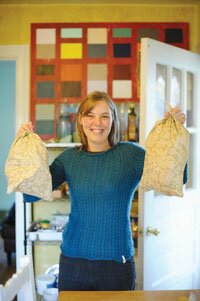
Rose Brown holds two years worth of garbage that she couldn't recycle and that would have gone into a landfill. Most Americans toss more than that a day.
PHOTO BY JEN FARIELLO
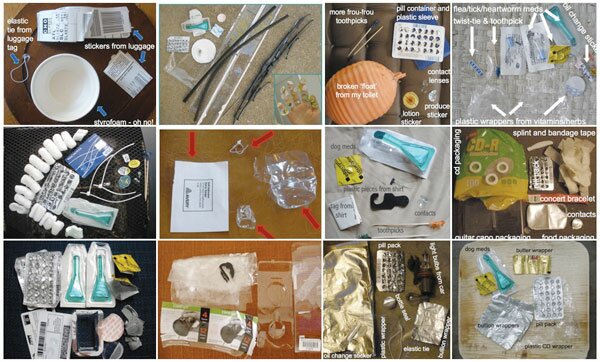
Rose Brown took a photo each month of the items she couldn't recycle, reuse, or compost.
PHOTO COURTESY ROSE BROWN
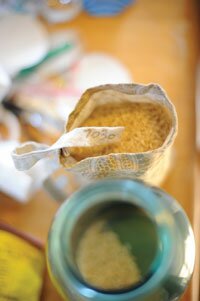
Brown buys in bulk as much as possible, and has eliminated the twist ties by writing the bin number on the drawstring in pencil.
PHOTO BY JEN FARIELLO
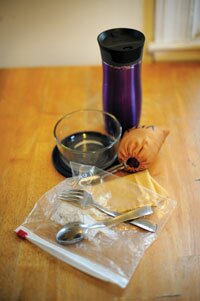
When Rose Brown dines out, she can avoid paper and plastic-ware with her own cup, utensils, cloth napkin, and container in which to put leftovers.
PHOTO BY JEN FARIELLO
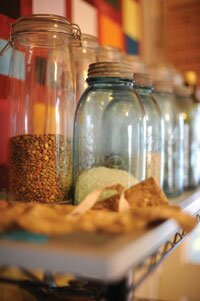
Rose Brown's shelves don't have an array of packaged food items.
PHOTO BY JEN FARIELLO
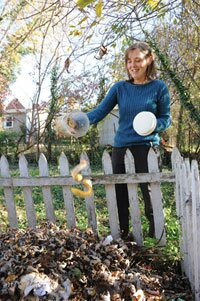
Quite a bit more than vegetable scraps can be composted, Brown discovered, like pizza boxes.
PHOTO BY JEN FARIELLO
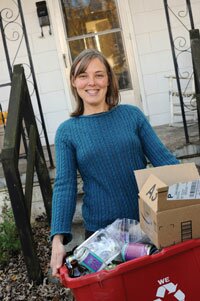
Her recycling bin is full, and Rose Brown hasn't thrown out a bag of garbage since 2008.
PHOTO BY JEN FARIELLO
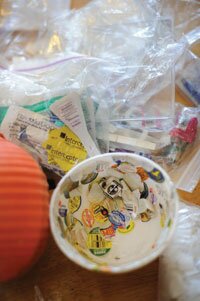
A styrofoam bowl, plastic stickers and flea medicine packaging are among the items Brown couldn't recycle in 2009.
PHOTO BY JEN FARIELLO
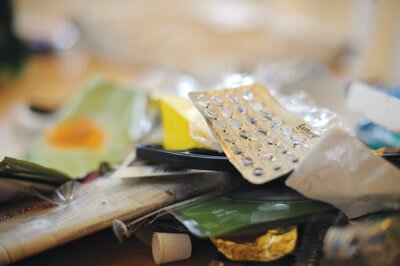
PHOTO BY JEN FARIELLO
#
27 comments
Rose is an inspiration. I haven't eliminated my trash output to the extent that she has, but her example has certainly reduced our input into the landfills. Thank you Rose!
However..... if you take and dig a hole in your backyard and bury anything that will never break down into the water table (glass, plastic, tires, etc,) what harm have you done? Once it is there and grass planted over it it will NEVER hurt anything.
Human beings sould not feel guilty for using landfills for anything that won't hurt the water table anymore than a cow should feel guilty for pooping in a pasture.
awesome, yet another non-news, filler story and the"cover" story at that. Speaking of not creating trash, why don't you just give up now & stop creating excess garbage.
I've been really appalled at the poor quality of the look & layout of you paper over the last few months, what happened? The covers are lame & some of the text layout is really sloppy & confusing.
oh yeah, why don't you get some one local to handle the bands here
Excellent article...well written and we all learned something about practical application of going green, and or using zero waste policies @ home...not all will be able to fullfill this total going green household system...but every little bit helps...Congrats Rose...makes me want to reduce my waste loads in my home even more...
sounds like someone deserves a Better World Betty "BRAG Award" for environmental excellence...and by the way am glad The Hook made this a cover story...made me want to read this paper again etc...of course online...
Hey Rose...wow...this is amazing. I didn't know you were doing anything like this. I commend you for it. Maybe others will follow you.
Fantastic article! The world could do with a lot more news stories like this. Rose shows by example what can be accomplished with effort and care. It's very easy to become complacent and not consider where the trash we throw away day after day, week after week, ends up. Thanks for setting an example Rose.
In response to "good for her..." The problem with landfills is that even things that would normally break down with time do not because there is no aeration. Newspapers that are 30 yrs old can still be found in good condition. Without the break down it piles up in the landfills and we will soon run out space for all the garbage. By creating your own mini landfill in your yard you are helping to keep our land as it is and moving biodegradable items back to the earth and back in it's intended cycle.
There are also plenty of good uses for recycled tires & plastics so we don't have to consume what's left of the non-renewable resources on earth.
And your statement that it will "NEVER hurt anything" is short sighted and limited to immediate effects of the water table. There is an entire life system that lives below the grass that is effected by what we bury and we are continually discovering harmful effects of poor decisions we made 30, 50 and 70 yrs ago that at the time were 'harmless'.
Rose has proven that we all can be more efficient in the way we recognize and deal with our waste. Thank you, Hook, for a good article. Well done, Rose!
But did she use a composting toilet? Other wise her other "waste" goes to the treatment center... gets a chemical treatment and then dumped in the river. http://humanurehandbook.com/
Most waste water is not treated chemically. What happens in a waste water plant is the same thing that happens in nature. It is simply condensed and concentrated. What does need to happen as far as the treatment of waste water is find a better use for the sludge that is left over from the treatment process. This is a nutrient rich incredible fertilizer but it can not be used because of regulations set in place by DEQ. This sludge is normally hauled of to.... you guessed it, Landfills!
I ended up with two bags of perrello mailings
Dat healthy food give ya boi nasty gas
I was really encouraged by this article, thank you. She is my personal hero today. I have started to change my behavior as a result. Part of the solution is to buy less and give away things you dont need or use. We wont find our enlightenment in the mall or the landfill, only in the little bit of nature we have not yet destroyed
the last picture looks to be birth control, I hope she continues to use that, but only one pack in two years?
We're nowhere near to the level of Rose, but we have drastically reduced our level of garbage just through recycling, and buying many foods in bulk, including water. (Foods we've bought in bulk include cereals, spices, nuts, grains, etc.) However after reading this article I'm inspired to do even better. As it stands we have bags set up in our apartment holding recyclable plastics, cardboard boxes/product packaging, and all the junk mail, envelopes, fliers, circulars, etc. that we get, as well as our City recycling bin which contains mostly all the glass stuff, thus eliminating SO much stuff that would otherwise go into the trash. As a result we sometimes can skip a trash week. (We were able to skip last week's trash pick up in fact.) So that's pretty good. We also reuse a lot of things too. I like her idea about bringing silverware and containers for leftovers with her in her bag. The "one time use" plastic cutlery thing has always bothered me. Use the fork or spoon once and throw it away?? It's a total shameless waste. Also, all the unnecessary packaging that covers so many of the products we use. It's there merely to cover something which usually doesn't need to be covered, then we rip it off or take the product out and just...throw it away.
I've always been thankful for the McIntire Recycling Center we have here because it really encourages recycling in a way that I haven't seen in other areas of the country where I've lived. I will say that I'm surprised that the state of Virginia doesn't recycle aluminum cans. Does anybody know the reason for this? In other states it's an entire industry in itself.
Also wanted to add that last I remember seeing, Whole Foods has a plastic bag recycling bin outside the front doors. People may not realize that. So we let ours accumulate then bring them in to WF in a big bunch. We also have the reusable canvas bags for shopping, which cuts back on brown bag usage. There's also a program here in Cville called "Recork Cville" for recycling all those wine corks that would otherwise get tossed in the trash. http://www.carpetplusonline.com/recork/
And of course there's cell phone recycling centers set up in various places for those who use the dreaded cell phone. (I don't.)
Oh yeah, and printer cartridge recycling...I know that Staples has a program where you can bring in your old printer cartridges, and even get points or credit or something for it. Other places may do that as well.
I think half the problem of recycling is to get the program started in the first place for recycling certain items. The McIntire center takes care of many things, but there are still all those miscellaneous things that we all throw away that could be recycled/reused. The other half of the problem is letting people know about it when these programs are established....then getting them in the habit of recycling, instead of just automatically throwing everything in the garbage bin.
If anybody knows of any other types of programs or centers set up in the area that recycle oddball miscellaneous things maybe post it here to let people know about it, spread the word.
google landfill space and see that we will never ever run out of landfill space... have you ever even traveled across the country? The only propblem with landfills is the water table. Prevent their inclusion and we will all be fine.
Running out of landfill space is a big fraud and easily refuted.
@ good for her
Yes, but, just because the land is there, does it mean it needs to be stuffed full of trash? For me the answer is no. There is no doubt this society is completely out of control in terms of consumption and waste generation. It never hurts for one to do their part to cut back. Granted, one person alone isn't going to make a dent in things, let's not kid ourselves, not when millions more are generating tons of garbage every year. (in the same way that one lone person riding a bike to "go green" isn't making a bit of a dent in things when millions more around the world drive exhaust spewing cars every day, and that's not even counting the air pollution generated by outside cook stoves in these other countries such as India. etc. etc.) BUT, if one person can spread the word and get hundreds of others to follow suit, and they in turn can get others to follow, then maybe it does make some sort of dent.
However, all of this is going to become a totally moot point though I imagine in a very short time, because things are about to *really* start hitting the fan in this society. ;) People aren't even going to be able to just go out there and mass consume anymore anyway. Cause, uh, you need a valid, functioning money system for that, and you also need a stable society that's operating in a "business as usual" way. So, yeah, good luck there. ;)
@ booo! the SPCA takes printer cartridges and old phones
Bravo, Rose! What an inspiring lifestyle change you have made. One area where you can reduce what little waste you produce is birth control. Have you ever heard of the modern methods of natural family planning? Monitoring your basal body temperature and cervical mucus properly can render an effectiveness of 99% (just as good as the pill). It's safe, healthy, nothing is thrown away, and the excess pharmaceuticals in your urine don't end up in the storm water. There are several teachers of nfp in C'ville.
What a shame Rose thinks it's OK to use toilet paper. There have been numerous posts online of using a washcloth instead, at least for urine. Put it in the laundry hamper every few days and get another one.
Rose, you are interesting, and pretty.
This downturn in the economy is helping your cause. My company manufactures a food product and the many energy, water, and waste efficiency programs are impressive. Most manual machine controls have been replaced by automated programmable controls which can provide just enough energy to get the job done, and energy is used "on demand" only.
Lower horsepower electric motors are geared properly to drive large loads. Cooking oil is pressed from crumb waste and reused, Lighting is only on when a room is occupied, Industrial refrigeration loads have been reduced by upgrading storage facility insulation. Another refrigeration improvement is the addition of back pressure regulators on our cooling vessels which when set properly will use refrigerant energy very efficiently.
Assembly line conveyors driven by hydraulic motors requiring large horsepower motor driven pumps for flow have been replaced by much smaller electric motors that are speed programmable. Vacuum waste blowers driven by large 100 horsepower motors have been replaced by augers driven by motors of 2 horsepower.
Plastic, cardboard and metals (lots of metal scrap when old systems were removed) are 90% recycled. Food waste is sent to a digester that produces electricity for a local utility.
HVAC controls are centralized and automated.
Preventive maintenance programs really help in this area.
I would like to say that we are driven by our love for mother earth but actually these initiatives are driven by a desire to drive competitors out of the market by offering our product at a more competetive price.
Many companies are making these investments, so as long as money is an issue for consumers, these efforts will continue.
Rose, about the vacuum. Try a Rainbow. It has water in the pan, no bags. You dump out the ick into the compost. Ours is 30 years old and counting.
This is really interesting, and inspiring, but I'm not sure I completely get it. She, personally, is throwing away less stuff, but is less stuff actually being thrown away? I understand the empirical value of recyling and composting, but in terms of choosing what to buy, it's not clear to me that the responsibility of throwing things away isn't just being passed on to someone else. Or am I missing something?
What an inspiring story. Obviously, not all of us can recycle and reuse as much as Rose does yet we should all aspire to try to cut down our garbage.
This is inspiring. I don't think I'd be able to do it (especially with a baby on the way), but reading about Rose Brown makes me want to make sure more things in my life are reusable.
I would think that eliminating shaving from one's daily toilet would not only save materials, but also keep from animals "discovering" the sharps and injure themselves.